
**Photo credit to Whitefish
"...Hive, to me, is the superior blockchain of all blockchains that I worked on..." - @nathansenn
INTRODUCTION
Hive.io and @dbuzz recently sponsored a Web3 event in Davao Philippines. "Blockchill Night" is an event initiated by @davaodeficom, #nftdavao and #mindanaoblockchainassociation to spread Web3 awareness, to educate people about the blockchain technology, and to help projects showcase their use cases and value propositions. It was a jam-packed event attended by blockchain enthusiasts, web3 educators, and even local venture capitalists. I was there.
@nathansenn, the co-founder of DBuzz and one of the key presenters expounded on Hive's superiority in security, speed, and decentralization. This compels me to dive deeper into Hive's ecosystem and learn the intricacies of the chain.
KEYS AND PERMISSIONS
The more a password or key is used, the greater the risk of it being compromised or stolen by unauthorized individuals. Hive recognizes this vulnerability and, in order to ensure the safety of its users, employs a hierarchical key system. This system issues users with four different keys, each with its own set of permissions. By using these keys appropriately and limiting the usage of any one key, Hive minimizes the risk of a security breach and keeps its users' accounts secure.
With @keychain, I explored Hive's ecosystem, and its distinctive key system allows me to reset keys and granting access at varying levels based on the type of key employed. Let's discuss this in detail.
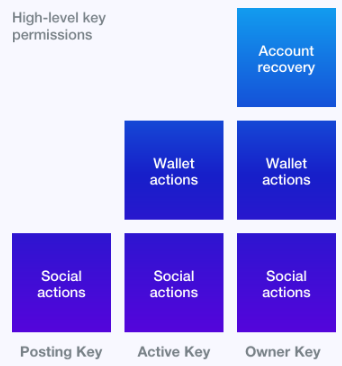
PRIVATE KEYS
Posting Key
This particular key is intended for social networking activities such as posting, commenting, and voting. It is assigned a restricted set of permissions and cannot be utilized for any monetary transactions, which means that even if it falls into the wrong hands, the attacker cannot use it to withdraw or transfer funds. You can safely use this key if you want to outsource management of your social network account to different people without having to worry on your funds.
Use this key for logging in to other social networks that are powered by Hive, such as Hive.blog, Busy, and Esteem.
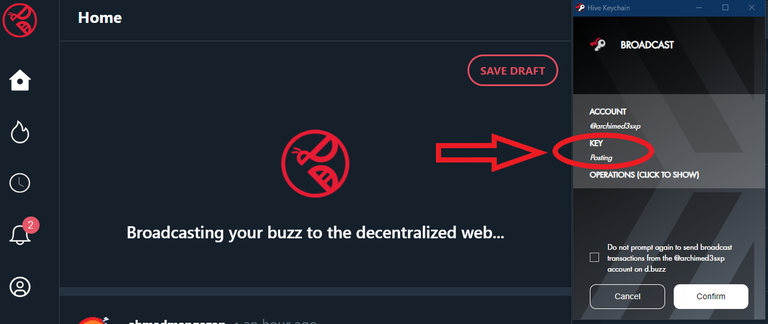
Posting in @dbuzz, a micro-blogging social media platform, my account uses the Posting Key.
Active Key
This particular key possesses additional permissions that allow users to perform more sensitive monetary-related actions such as transferring and exchanging tokens. When conducting any wallet-related action, users are usually required to authenticate using their Active Key. It is vital to exercise caution and only enter this key into applications or platforms that you trust, as anyone who gains access to it can potentially take control of your tokens
Do yourself a favor and store this key safely to avoid losing tokens in the future.
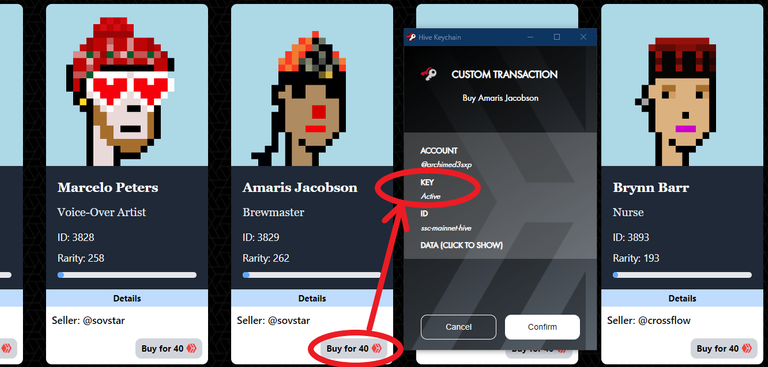
Buying an Punks NFT requires wallet-related action. My account uses Active Key to perform the transaction.
On the sidenote, I learned that I have to convert my HIVE to SWAP.HIVE before buying. This is because HIVE is a layer 1 blockchain where everything is settled and SWAP.HIVE is a layer 2 blockchain which adds the smart contract that expanded HIVE functionality to wallet-related transactions. I might create another post about this in the future.
Owner Key
The Owner Key is a critical component of the Hive key system, as it is the only key that can change or modify the other keys assigned to the user's account. It possesses additional permissions to recover a lost account or reset any of the other keys.
Due to its high level of authority, the Owner Key is considered the most important key and must be kept in a secure location offline to prevent unauthorized access. This is because if the Owner Key is compromised or stolen, an attacker could potentially take complete control of the user's account and access all the sensitive information and funds held within it.
The Owner Key also has a partner "Password". It has the same use case as the Owner Key, but is a duplicate key, in case the Owner Key is lost.
Memo Key
The Memo Key in the Hive key system serves a unique and specific purpose, which is to encrypt and decrypt private messages transmitted through the blockchain. Unlike the other keys, the Memo Key does not possess any monetary-related permissions or the ability to modify other keys.
While the encryption and decryption of private messages through the blockchain can be a valuable and powerful feature in the future, it is currently not widely used. However, if a user receives a private message that requires decryption, it is recommended to use the Memo Key, which has the minimum necessary authority for this task.
PUBLIC KEYS
Together with the private keys mentioned above, Hive key system uses public key to encrypt and decrypt data. Each Hive Key has a public and private key to encrypt and decrypt data. The public key is associated with a user's username and can be used to look up associated transactions on the blockchain. public keys are not required for login on Hive.blog, and as such, there's no need to store them safely.
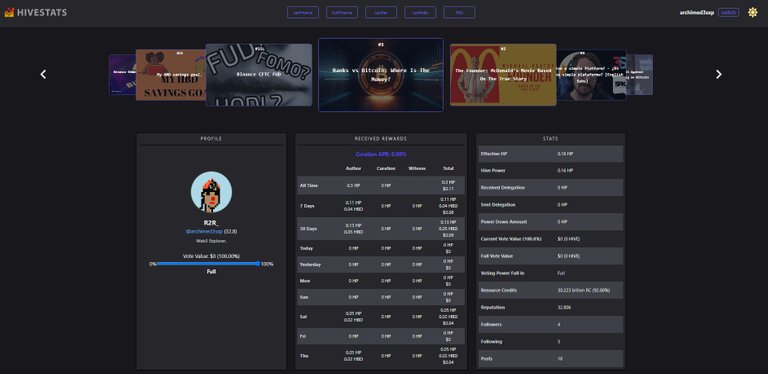
If you go to Hive Stats and seach my username "archimed3sxp", you can publicly see all my activities in Hive network; thus, public key.
SCALABILITY
Scalability of blockchain networks is the ability of that platform to support increasing load of transactions, as well as increasing the number of nodes in the network. During the abovementioned Blockchill Night event, @nathansenn emphasized Hive's speed, with 3-second block times and zero-fee transactions, made possible by the resource credit system. I have experienced it with my own eyes as all the transactions I previously made for this article took approximately 3 seconds to complete without asking for gas fee or transaction fee. This is the fastest so far comparing to other transactions I had with other chains.
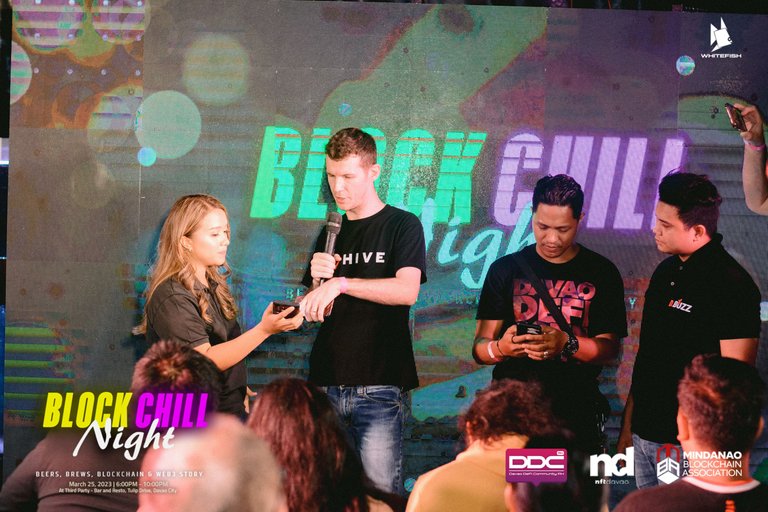
Nathan Senn demonstrating the speed of Hive blockchain in handling transactions to the participants of Blockchill Night.
**Photo credit to Whitefish
DECENTRALIZATION
Hive is a blockchain network that utilizes a delegated proof-of-stake (DPoS) consensus mechanism. This means that users who hold HIVE tokens can participate in the decision-making process by voting for witnesses who validate transactions and produce blocks on the network. The voting power of a user is proportional to the amount of HIVE tokens they have staked as HIVE Power (HP). By staking HIVE tokens, users lock them up for a certain period, which reduces the supply of HIVE in circulation and increases its scarcity.
Hive's Whitepaper states:
Blocks are produced at 3 second intervals and are signed by “Witnesses” selected based on the total weight of the Hive Power supporting them through individual approvals. There are 20 consensus witnesses that are granted block signing operations on a rotating schedule.
Every account may select up to 30 witnesses for approval, during which process it adds to the support each witness receives. The witnesses are ranked in priority based on the total amount of staked support they presently receive. While the 20 consensus witnesses have an equal opportunity to sign blocks, witnesses ranked 21 and further are treated as backup witnesses. The number of signing opportunities they receive is directly proportional to the staked support behind them.
Should a witness be unable to sign a block due to operating on a protocol version incompatible with the main chain or due to any other technical issue, the signing opportunity will be automatically granted to the next scheduled witness. The witness that failed to sign will be recorded on chain as have missed a blocks. The number .
Witnesses is kept low to ensure a high transaction speed and prevent network congestion. These Witnesses are incentivized to act honestly and efficiently since they receive a portion of the newly minted HIVE tokens as a reward for their work. Users can vote for Witnesses by staking their HIVE tokens as HP. The more HP a user has, the more weight their vote carries.
In addition to DPoS, Hive also uses a unique protocol called Proof of Brain (PoB). This protocol rewards content creators based on the popularity and engagement of their posts on the Hive social media platform. The more popular a post is, the more HIVE tokens the creator receives as a reward. This helps to encourage engagement and high-quality content creation on the platform.
Overall, Hive's combination of DPoS and PoB protocols creates a unique and decentralized platform where users have a say in the decision-making process, and content creators are rewarded for their contributions.
SUMMARY
With the security, scalability, decentralization that Hive offers, it is truly designed with widespread adoption of the currency and platforms in mind. This means that the platform is built to be user-friendly and accessible to people from all walks of life. As more people adopt Hive, the platform has the potential to become a leading Web3 blockchain, powering the creation and deployment of a wide range of decentralized applications.
Overall, Hive is an innovative and forward-looking blockchain platform that is well positioned to become a key player in the Web3 ecosystem. Its fast processing times, fee-less transactions, and focus on user adoption make it an attractive option for individuals and businesses looking to leverage blockchain technology for their needs.

Attendees of the recenetly concluded 'Blockchillnight powered by Davao Defi Community, NFT Davao, and Mindanao Blockchain Association
**Photo credit to Whitefish
Thank you for all the amazing work you do to promote HIVE + DAPPs to more users. If freedom needs to have a chance at surviving through the coming years, we are going to need projects like HIVE, Koinos, @spknetwork to succeed.
!PIZZA
!LUV
!CTP
@archimed3sxp, @vimukthi(1/1) sent you LUV. | tools | discord | community | HiveWiki |
HiveWiki |  NFT | <>< daily
NFT | <>< daily
Thank you so much for the appreciation. Yes, HIVE really has huge potential in shaping the future of Web3.
I will try to check the project you mentioned as well. Thanks for sharing.
Posted via D.Buzz
$PIZZA slices delivered:
@vimukthi(1/5) tipped @archimed3sxp (x1)
what's with the $PIZZA slices? sorry, I'm new to this ecosystem @vimukthi
Posted via D.Buzz
An excellent post. I've often wondered why we have a Memo key when Hive doesn't have a private messaging system. It was wise, however, to include it as it would create an opportunity for future developments.
Also, I didn't realize this:
As a freelance writer, this makes it super easy to sell the idea of managed Hive blogs for businesses. Some businesses might be reluctant to try Hive if they don't have a dedicated staff writer. But hiring a freelancer to manage the content without compromising financial security would be a huge boon.
I'm including this post in today's Cryptocracy newsletter, titled "Write3 Wednesday: 5 Web3 Writers You Should Know".
Thank you so much for the appreciation, Sir.
Yes, I am excited about where Hive will bring web3 in the future.
I am enjoying every bit of my exploration here.
And thank you so much for mentioning me in your newsletter.
Posted via D.Buzz
You're welcome. Doing my part to highlight good content.
~~~ embed:1641279837808775168 twitter metadata:MTM2Mzg1OTk4OTExNTIzMjI1N3x8aHR0cHM6Ly90d2l0dGVyLmNvbS8xMzYzODU5OTg5MTE1MjMyMjU3L3N0YXR1cy8xNjQxMjc5ODM3ODA4Nzc1MTY4fA== ~~~
The rewards earned on this comment will go directly to the people( @allentaylor, @archimed3sxp ) sharing the post on Twitter as long as they are registered with @poshtoken. Sign up at https://hiveposh.com.